 Did you know? Promoting gratitude within your family can be as straightforward as initiating a daily gratitude journal! Taking a moment each day to ponder on the positives can have a profound impact on uplifting moods and nurturing a sense of well-being for all. Encourage every family member to jot down something they're grateful for, regardless of its magnitude. Let's embark on this journey of gratitude collectively, strengthening our familial bonds one thankful moment at a time!
0 Comments
 Did you know? You can promote independence in your child by assigning age-appropriate tasks and granting them responsibilities around the house! Encouraging them to tackle these tasks not only aids in the development of vital life skills but also enhances their confidence and sense of achievement. From tidying up their room to assisting with meal preparation, every task imparts valuable lessons in accountability and self-reliance. Let's empower our youngsters to flourish independently and evolve into capable individuals! Share your insights and experiences with task delegation in the comments below!  Did you know? You can foster your child's critical thinking skills by asking open-ended questions and fostering an environment where they feel comfortable expressing their opinions! Engaging in conversations that encourage deep thought and reflection aids in the development of analytical skills and broadens their perspective. Challenge them with thought-provoking questions such as "What are your thoughts on...?" or "How might you approach...?" Let's empower our young thinkers and witness the expansion of their minds! 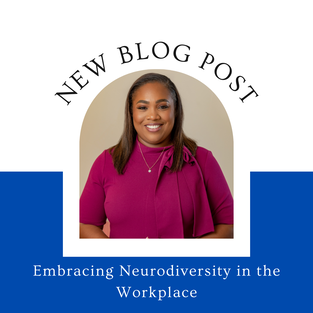 In today's rapidly evolving workforce, diversity is not just a buzzword—it's a cornerstone of innovation and success. Yet, when we talk about diversity in the workplace, it's essential to recognize that it extends far beyond race, gender, and ethnicity. One often overlooked aspect of diversity is neurodiversity, which encompasses individuals with neurological differences such as autism, ADHD, dyslexia, and other conditions. As we strive to build more inclusive workplaces, it's crucial to embrace neurodiversity and tap into the unique talents and perspectives of neurodivergent individuals. But what does neurodivergent mean, and why should employers understand what it means to hire a neurodivergent employee? Neurodivergent individuals have brains that function differently from the neurotypical population. This can manifest in a variety of ways, from differences in communication and social interaction to heightened sensory sensitivities and strengths in areas such as pattern recognition, problem-solving, and attention to detail. Embracing neurodiversity means recognizing and valuing these differences as strengths rather than deficits. Employment opportunities are particularly important for neurodivergent individuals for several reasons. Firstly, gainful employment provides a sense of purpose, belonging, and financial independence, contributing to overall well-being and quality of life. Secondly, by harnessing the unique skills and perspectives of neurodivergent individuals, businesses can drive innovation, creativity, and productivity. Research has shown that diverse teams are more effective at problem-solving and decision-making, leading to better outcomes for organizations as a whole. As we witness a growing number of children being identified as neurodivergent, it's crucial to recognize that this demographic will inevitably transition into adulthood. By proactively creating inclusive workplaces and offering meaningful employment opportunities, employers can play a pivotal role in fostering a more inclusive society for neurodivergent individuals. So, how can employers create a more inclusive environment for neurodivergent employees?
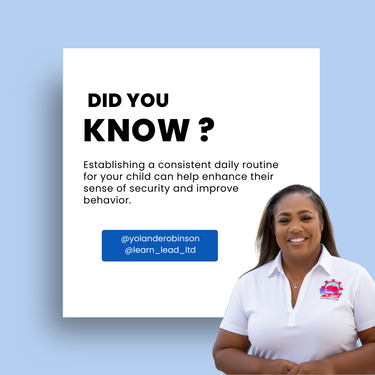 Establishing a consistent daily routine for your child can be transformative in nurturing their sense of security and enhancing behavior. Let's have a heartfelt discussion about one of the most powerful tools for fostering growth: ROUTINE! Whether it's guiding them through a structured morning routine, sharing meals at set times, or winding down with a soothing bedtime ritual, consistency provides a sanctuary of stability and comfort for our little ones. It's not just about structure; it's about instilling lifelong skills in time management and responsibility. By embracing routine, we're not only nurturing our children but also easing the burdens of parenting. Let's embark on this journey together, creating a haven where our children can flourish. Share your insights on building routines in the comments below. Together, let's cultivate a nurturing environment where every child can thrive! As we enter April, Autism Awareness Month, I am compelled to share a few thoughts on fostering understanding and inclusion.
For several years, The Dawn Program for Autism and Behavioral Sciences found a home at Learn and Lead. This was a cherished opportunity for us at Learn and Lead to offer parents and their children supportive spaces where they could gain deeper insights into Autism. It also allowed us to provide invaluable services such as ABA Therapy and parent coaching, all thanks to the dedicated efforts of Nicole Cox and her exceptional team. While the chapter of the Dawn Program at Learn and Lead closed its doors in 2019, those who tune in regularly to my podcast know that Nicole has continued to extend her support whenever needed. My dedication to supporting families with ASD remains steadfast, and I wish to seize this moment to shed more light on ASD—not just for awareness sake, but to catalyze the actions required to better support ASD families within our communities. According to the World Health Organization, 1 in 100 children worldwide are diagnosed with Autism. In the United States, statistics from Autism Speaks reveal a staggering reality: 1 in 36 children and 1 in 45 adults are on the autism spectrum. Additionally, boys are nearly four times more likely to be diagnosed with autism than girls. But beyond the numbers lies a vibrant and diverse community of individuals, each with their own unique strengths, challenges, and perspectives. Autism is not a one-size-fits-all condition; rather, it encompasses a broad spectrum of traits and characteristics that manifest differently in each person. For families living with Autism, navigating daily life can present unique challenges. From sensory sensitivities to social communication difficulties, the journey can be both rewarding and demanding. As neighbors and fellow community members, it's our responsibility to offer support and understanding to these families. So, what can we do to create a more inclusive and supportive community for individuals with Autism and their families?
We all go through it - times when we just can't get tasks finished despite the fact that "nothing" is in our way. Well, nothing except procrastination. Adults, children and teens alike, all battle the inertia brought on by procrastination. Yolande and Latasha touch on topics such as instant gratification and perfectionism along the way to cracking the nut that is procrastination. This episode and it's takeaway tips will help listeners identify what's really in the way, and move from delay to done.
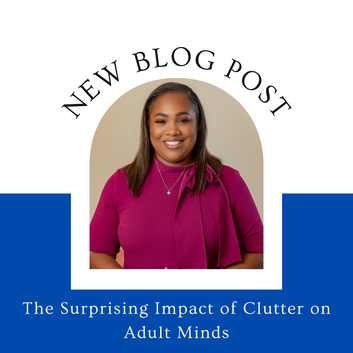 Earlier this week, we delved into the world of children's learning spaces and the profound effects of clutter on their academic success. Today, let's shift our focus to the adults in the room – literally! The impact of clutter doesn't end with childhood; it extends into our lives as grown-ups, affecting our mental clarity and overall well-being. In this blog post, we'll explore the surprising ways clutter can influence the adult mind, and I'll share some practical tips on decluttering and maintaining an organized space for enhanced mental peace. The Mental Toll of Clutter Clutter isn't just a physical eyesore; it takes a toll on our mental well-being. The chaos that surrounds us can contribute to stress, anxiety, and a feeling of overwhelm. As adults juggle work, family, and personal responsibilities, a cluttered space becomes a constant source of distraction, hindering our ability to focus and think clearly. Organized Spaces, Clear Minds On the flip side, an organized space can be a game-changer for mental clarity. When our surroundings are neat and tidy, our minds are free to concentrate on the task at hand. Creating an organized environment fosters a sense of control and calm, contributing to increased productivity and a more positive mindset. Practical Tips for Decluttering
Maintaining an Organized Space
As we witnessed the impact of clutter on children earlier this week, let's not forget the influence it has on our adult lives. By embracing organization and decluttering, we pave the way for mental clarity, reduced stress, and a more focused approach to life's challenges. Take the first step towards a clearer mind today, and watch as the benefits ripple through every aspect of your adult life. THE CRUCIAL ROLE OF ORGANIZATION IN LEARNING SPACES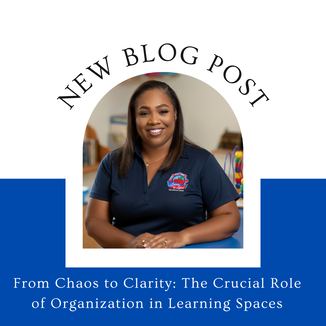 As an educator and a mom, I have always been fascinated by the intricate relationship between a child's learning environment and their academic success. Over the years, I have come to appreciate the significance of a well-structured space in fostering a positive and conducive learning atmosphere. One factor that often goes underestimated is the impact of clutter on a child's ability to learn. In this blog post, I will delve into the challenges clutter poses to the learning environment, emphasize the importance of organizational skills, and discuss how having everything in its place can profoundly influence a child's success – a truth that extends beyond special needs children to encompass all young learners. The Clutter Conundrum Picture a classroom or a home filled with disorganized desks, scattered toys, and miscellaneous items strewn across the floor. It might seem like a trivial concern, but the truth is, clutter can create an overwhelming and distracting environment for children. As an educator, I have witnessed firsthand the impact that a cluttered space can have on a child's ability to focus, retain information, and engage in productive learning. Organizational Skills: A Foundation for Success One of the keys to overcoming the challenges clutter presents is the cultivation of organizational skills. Just as adults benefit from a well-organized workspace, children thrive in environments where everything has its place. Teaching children to organize their belongings not only promotes a sense of responsibility but also enhances their cognitive abilities. Organizational skills empower children to manage their time effectively, locate resources independently, and develop a structured approach to tasks. Beyond Special Needs: A Universal Necessity While it is true that children with special needs may face additional challenges in navigating cluttered environments, the importance of organization transcends any specific learning profile. All children, regardless of their individual needs, benefit from a structured and organized learning space. By instilling good organizational habits early on, we equip children with the tools they need to succeed academically and beyond. The Impact of a Well-Structured Environment A well-structured environment goes beyond the physical arrangement of objects; it extends to the overall atmosphere of the learning space. Children thrive in environments that provide clear expectations, routines, and a sense of order. When everything has its place, children can focus more effectively on learning, fostering a positive attitude towards education and enhancing their overall academic experience. Practical Tips for Creating an Organized Learning Environment
As both a mom and an educator, I am continually reminded of the profound impact that a clutter-free, well-organized environment can have on a child's learning journey. The benefits extend far beyond the immediate academic realm, influencing a child's overall development and shaping their lifelong habits. By prioritizing organizational skills and emphasizing the importance of everything having its place, we set the stage for success by laying important and essential groundwork. 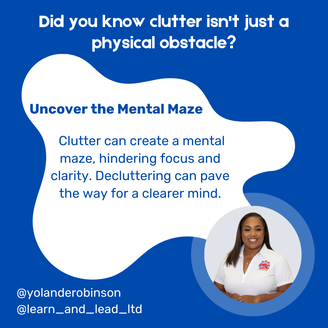 Ever felt overwhelmed by the chaos around you? Clutter isn't just a physical hurdle; it's a mental maze that can cloud focus and hinder clarity. 🧠✨ Join me this week as we explore why decluttering spaces can have a transformative power on the mind. Did you know that decluttering can:
 Earlier this week, we delved into the world of procrastination in children, exploring its signs and strategies to help them navigate this common challenge. But what if, as you read those words, you found yourself nodding along, recognizing your own procrastination tendencies? Let's talk about it. First things first, take a deep breath. Procrastination is not an exclusive visitor to the world of childhood—it's a familiar companion for many adults too. Whether it's putting off tasks until the last minute or feeling overwhelmed by a mounting to-do list, the struggle is real. But the good news? You're not alone, and there are ways to tackle it head-on. Identifying Procrastination in Yourself:
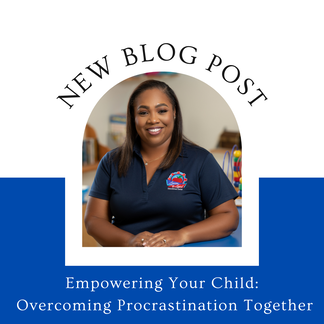 Procrastination is a familiar foe to many, and children are not exempt from its grasp. As an educator, I've witnessed firsthand how procrastination can impede a child's academic progress and cause unnecessary stress. However, it's essential to recognize that procrastination is a habit that can be overcome with guidance, patience, and the right strategies. In this post, I'll explore what procrastination looks like in children and offer practical ways parents can support their child in dealing with it. Understanding Procrastination in Children: Procrastination in children can manifest in various ways, making it challenging for parents to identify. Some common signs include:
Supporting Your Child in Dealing with Procrastination:
Remember, overcoming procrastination is a gradual process that requires consistent effort and support. Be patient with your child and acknowledge their efforts in making positive changes. By implementing these strategies and fostering a supportive environment, you can help your child develop effective habits to conquer procrastination and achieve their full potential. This week we're diving headfirst into the world of procrastination! Join me as we unravel the mysteries behind procrastination—what it truly is, the telltale signs to watch for, and most importantly, how to address it both in our children and within ourselves. We'll explore the nuances of this delay trap, equipping you with invaluable insights to help guide and support your kids through procrastination struggles. Additionally, we'll delve into effective strategies to tackle procrastination in your own life, empowering you to conquer those postponement tendencies. Stay tuned for a week filled with eye-opening discussions, actionable tips, and proactive approaches to bid procrastination farewell!
FAMILY REFLECTIONS AT YEAR'S END 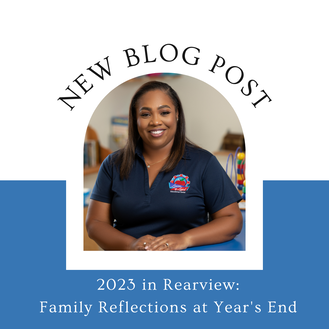 Reflection is a powerful tool that allows families to bond, learn, and grow together. As the year draws to a close, taking the time to reflect on the experiences, challenges, and successes of the past year can be incredibly beneficial. It provides an opportunity for parents and children to connect on a deeper level, fostering open communication and understanding within the family unit. Through reflection, families can celebrate achievements, learn from setbacks, and set intentions for the future. Here are five writing prompts designed to help parents engage their children in meaningful conversations about the events and lessons of 2023. Writing Prompts: Memorable Moments: Encourage your child to recall and write about three memorable moments from 2023. These could be experiences, events, achievements, or even small moments that brought joy or made an impact on them. Discuss why these moments stood out and their significance. Challenges and Growth: Ask your child to reflect on a challenge they faced this year. Have them write about how they navigated through it, what they learned, and how it contributed to their personal growth. Encourage them to share any strategies they used to overcome the challenge. Family Time: Reflect on the time spent together as a family in 2023. Have each family member write about their favorite family activity or outing and why it was special to them. Discuss how spending quality time together strengthened your family bond. New Discoveries and Learning: Prompt your child to write about something new they learned or discovered in 2023. It could be a new skill, hobby, interest, or knowledge gained from a particular experience. Discuss the importance of continuous learning and exploration. Setting Intentions for the Future: Encourage your child to think about one thing they would like to achieve or improve upon in the upcoming year. Have them write about their goal and the steps they plan to take to work towards it. Discuss how setting intentions can help create a sense of direction and motivation for the future. These writing prompts provide an avenue for families to share thoughts, experiences, and aspirations, fostering a supportive environment for reflection and growth. By engaging in these activities together, parents can strengthen their connection with their children and create lasting memories while imparting valuable lessons about self-reflection and personal development. Yesterday, Mrs. Guilmise Pierre was delighted to make a trip to South Caicos to work with the 4th and 5th formers from the Marjorie Basden High School in observance of National Youth Week.
Mrs. Guilmise conducted a Youth Skills Workshop under the theme of “Celebrating Youth Leadership - Empower, Envision, Energize, Educate, Engage" This interactive workshop had participants engaging in activities, games and discussions around topics of:
Earlier this week, I had the pleasure of joining the grade 5 students at Precious Treasures International School to discuss the Emotions and Learning.
The students enjoyed learning, discussing and making real life connections as to how their emotions can affect their depth of their learning and retention. Way to go Grade 5!
Last Friday we celebrated International Literacy Day at Oseta Jolly Primary School. Mrs Guilmise and Mrs. Lorna were invited to Oseta Jolly Primary School to have a Read Aloud session with Grade 5 students. The team shared one of our favorite books, "Christopher, Clean Your Room!" by Itah Sadu. They also spoke on the importance of reading and how much fun it can be. The event was a success! Students were very engaged in the story by making predictions and drawing conclusions about the character. A big thank you to all the teachers and students of Oseta Jolly for a job well done for your commitment on promoting reading!
This week we joined the teens at Edward Gartland Youth Center for 3 sessions. The themes covered in these sessions included:
​ This week were excited for the re-launch of Lit for Birth which was a program started by Jamell and me in 2017. As owners of Learn and Lead, and as parents us, we saw how easily language development and early literacy could fall through the cracks. We wanted to raise awareness on the importance of early steps that you can take to ensure your child has the best start possible.
Literacy from Birth, which we referred to as Lit from Birth, was a program that was launched in conjunction with InterHealth Canada. The nurses and midwives at IHC were trained on how to explain early language and literacy concepts to moms and provide them with a board book and a list of tips at the time of discharge. This program ran from June 2017 (the period of birth of our youngest) until April 2020 when we had to adjust to the challenges of COVID 19. In that period hundreds of books were given to moms and little ones in Providenciales and Grand Turk. The Youth Help Foundation and United Way, with a little support from us, has taken over the reins of this program. We are grateful to see this program come to life again and want to encourage parents and caregivers to be intentional about stimulating language and literacy from birth. 90% of brain development occurs in the first 5 years of life, and we want to make sure we are creating environments where our little ones can thrive to their potential. For more about the program, contact the Youth Help Organization. [email protected] On Friday, June 23 we were happy to support Mrs. Melisha Williams on her grand opening of Oasis ABA Consultancy. Oasis ABA consultancy will provide specialized therapy services for children and young adults with learning and behavioral challenges. It will also provide parent training and support for many families in the islands. Congratulations Mrs. Williams on this enormous achievement. We wish you all the success with your future endeavors.
Connect with Oasis ABA Consultancy at 649 343 5534 or [email protected] 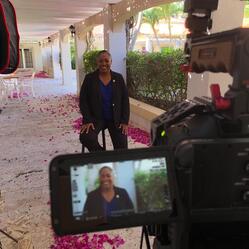 In this second video with the Youth Help Foundation, I touch on 10 important skills that parents can nurture with their children in the early years. "The Youth HELP Foundation empowers vulnerable children and young people to maximize their innate potential through partnerships with other non-profit and civil society organizations that together ensure equitable access to resources for health, education and literacy programs." If you would like to know more about the Youth HELP Foundation, visit their website at www.youthhelpfoundation.org. Last night it was a pleasure to join the Rotary Club of Providenciales to discuss Mental Wellness for Mental Health Awareness Month. In our time together we look at mental health, stress management and work-life integration.
Rotarians and their guests were encouraged to spend the time learning about mental health, gaining strategies for stress prevention and stress management, and evaluate their work life balance. Our closing activity encouraged them participants to evaluate where they are in 8 domains of their life and make a plan for where they would like to be in order to achieve their own 'work-life' balance.  As you know, at Learn and Lead we are extremely passionate about early childhood development, so we were more than happy to support the Youth Help Foundation in an initiative to raise awareness. "The Youth HELP Foundation empowers vulnerable children and young people to maximize their innate potential through partnerships with other non-profit and civil society organizations that together ensure equitable access to resources for health, education and literacy programs." If you would like to know more about the Youth HELP Foundation, visit their website at www.youthhelpfoundation.org. In this video we discuss the type of development that we would like to see children have in the early childhood years that make them ready for school and ready to learn. We want them to be able to:
Yesterday I spent some time at Fortis TCI speaking about Stress Management and Work Life Balance in honor of Mental Health Awareness Month. We spoke about stressors, practical ways for monitoring and managing stress, and preventative measures. When it came to work life balance, we discussed whether this was possible. The consensus seemed to be that we had to first define what balance looks like for us. Participants completed a short activity that helped them highlight their priorities in this season in their life and what balance could look like for them.
|
Author
Yolande Robinson, M.Ed. PodcastShifting Perspectives is a conversation with Yolande and Latasha that challenges Listeners to fuel themselves with diversity in the way they think, the way they work, the way they parent and the way they live their lives.
Listen to Shifting Perspectives on Apple Podcasts, Audible, Amazon Music, Spotify, Google Podcast, Stitcher, Pocket Casts, Overcast, Castro, Castbooks, or Podfriend. Archives
July 2024
Categories
All
|

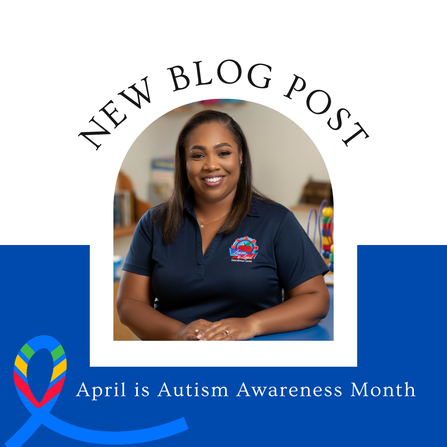
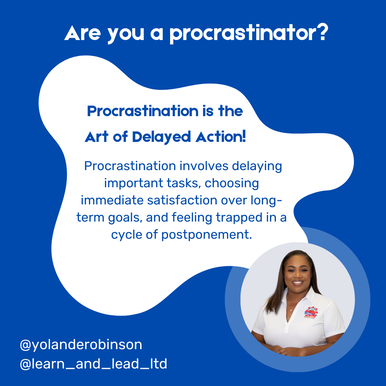
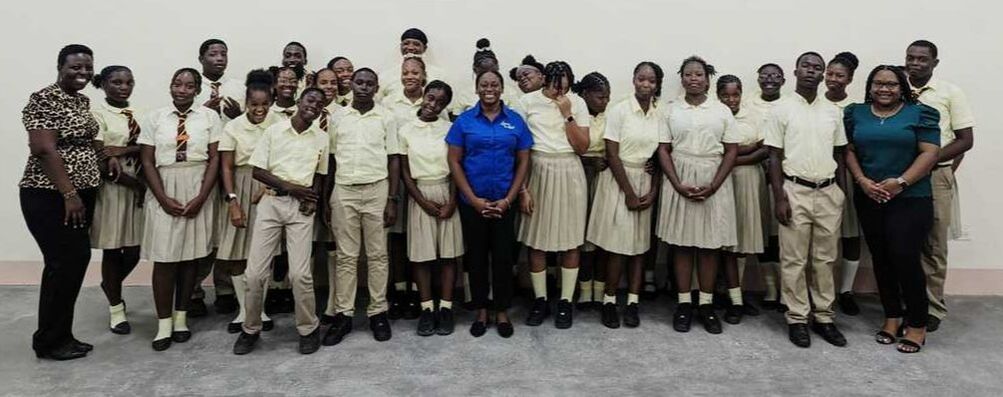
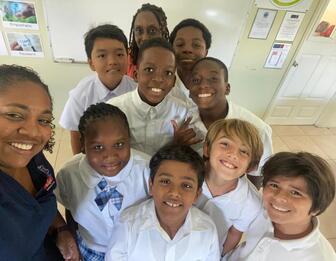
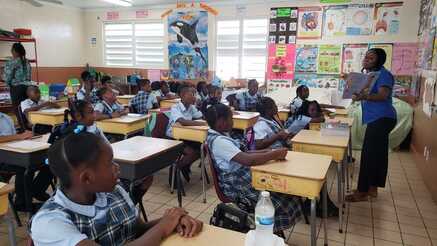
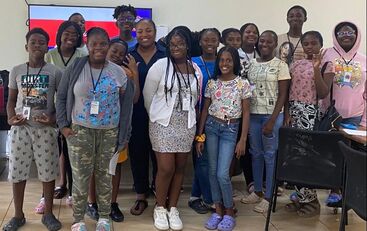
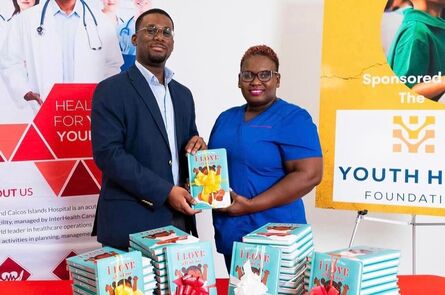
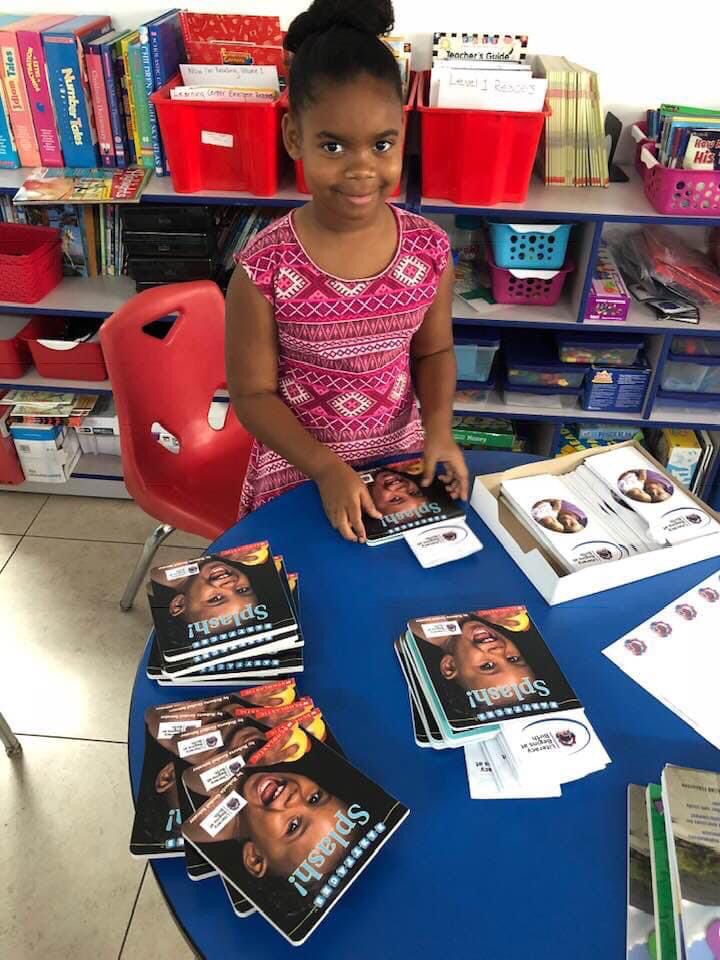
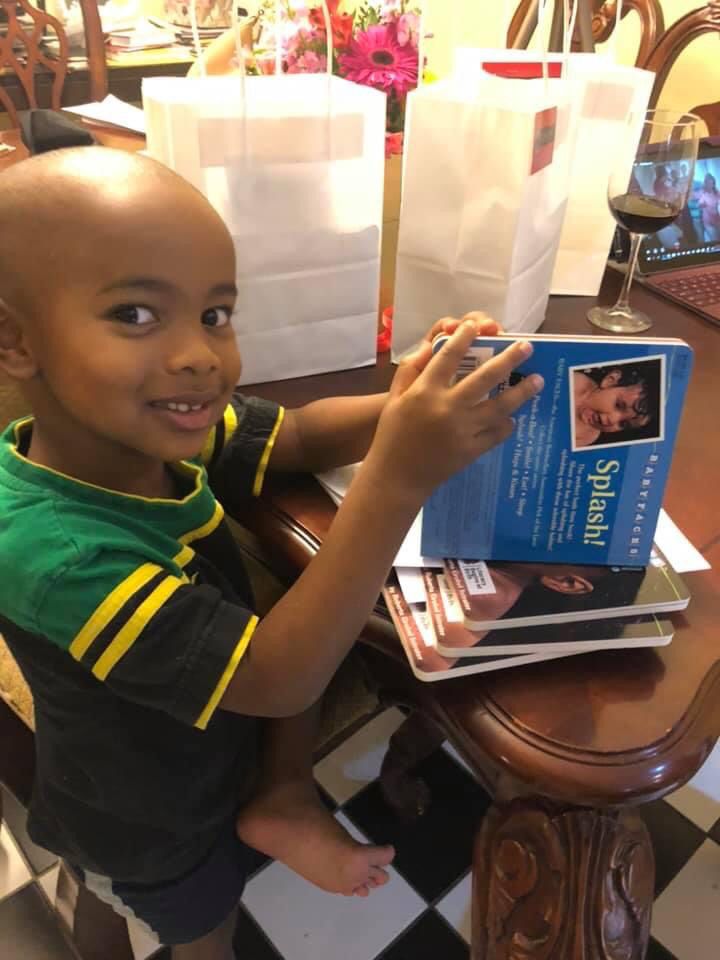
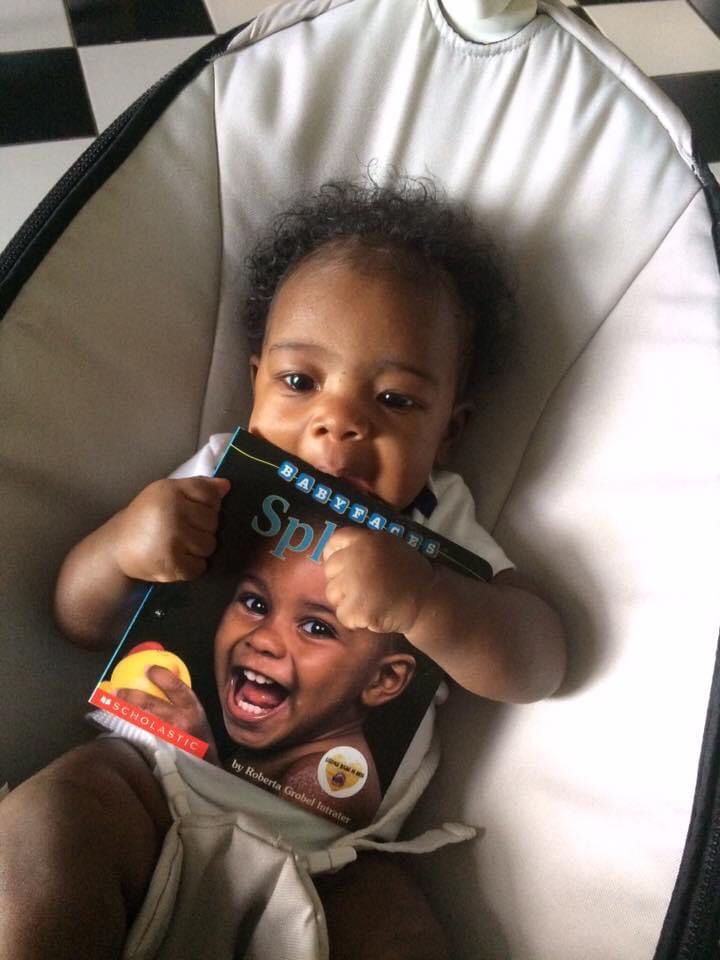

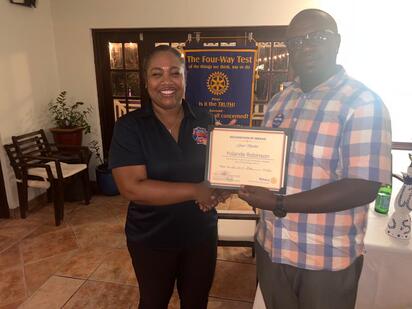
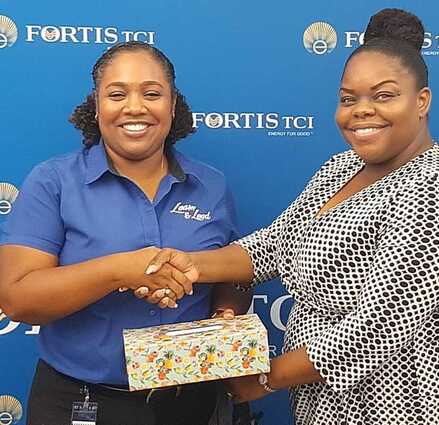

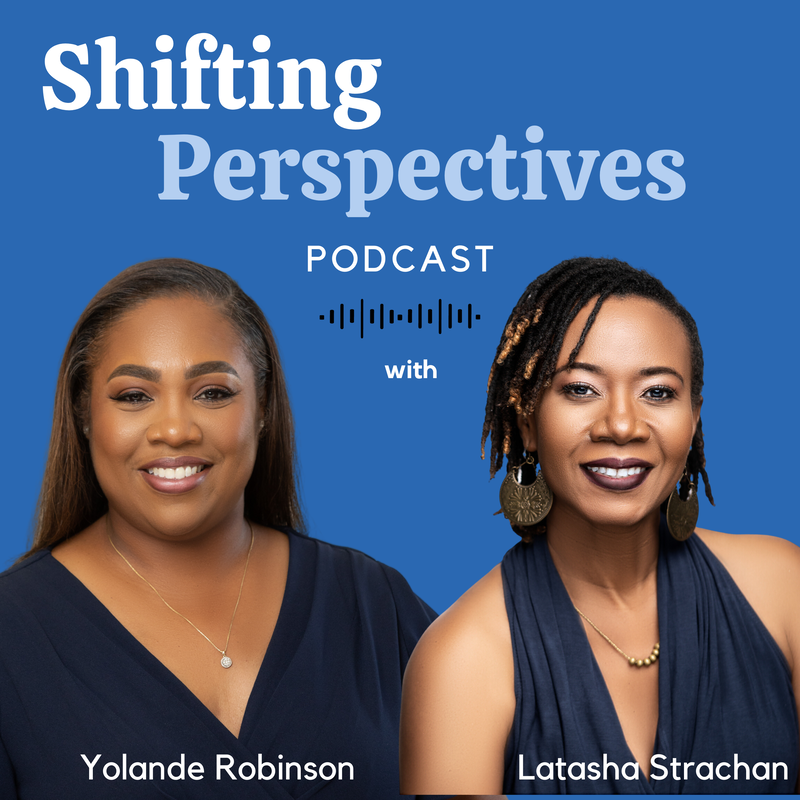
 RSS Feed
RSS Feed